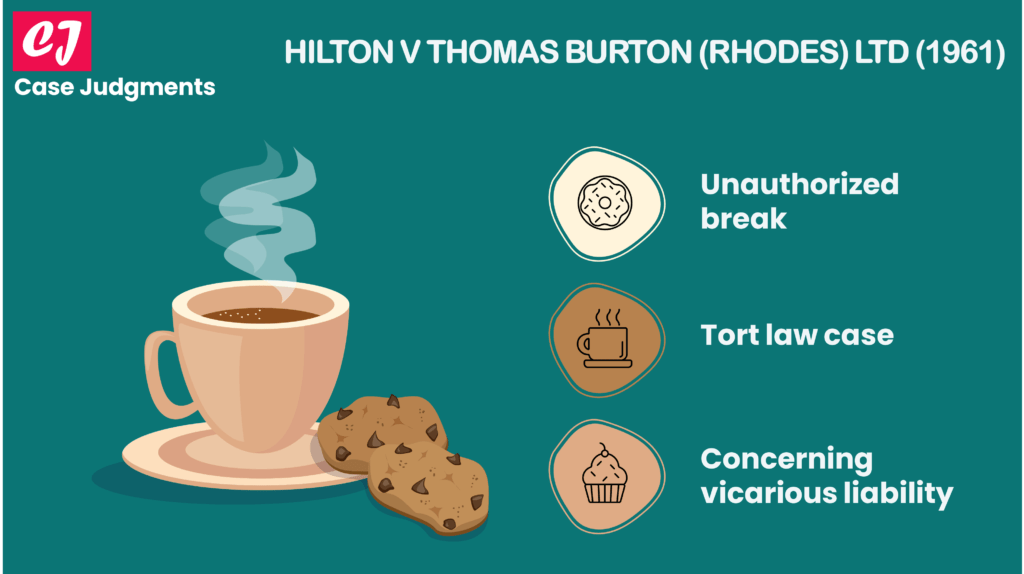
Lister v Romford Ice & Cold Storage Co Ltd [1957]: Case Summary
Case name & citation: Lister v Romford Ice & Cold Storage Co Ltd [1957] AC 555; [1957] 1 All ER 125
Court and jurisdiction: House of Lords, England and Wales
The bench of judges: Viscount Simonds, Lord Morton of Henryton, Lord Radcliffe, Lord Tucker and Lord Somervell of Harrow
Area of law: Vicarious liability
What is the case about?
This case of 1957 talks about the employee-employer relationship. Here, the House of Lords held that even though an employer is vicariously liable for the acts of his employee, the employee also bears a duty of care towards the performance of his duties under the employment.
Case facts (Lister v Romford Ice)
In this particular case, which was heard and decided in the year 1957, the appellant worked for the respondent employer as a lorry driver. During the course of his work, the employee was reversing the lorry when he inadvertently ran over and injured his father, who was assisting him. The father filed a claim for damages against the employer on the grounds that the employer was vicariously liable for the negligent driving of the employee.
The father’s claim was successful, and the employer (& its insurers) then sought contribution or, as an alternative, an indemnity from the son for breach of an implied term in the contract of employment that stated the son would exercise reasonable care while driving the lorry.
Issue
Was the employee liable to indemnify the employer for damages that the employer had to pay?
The contention by the appellant
The son claimed there was an implied term of his contract of service that he would receive indemnification from the employer (respondent) against all claims & proceedings brought against him for any act done in the course of his employment or that alternatively, he would be entitled to the benefits of any insurance contracts effected by the respondent.
Judgment of the Court in Lister v Romford Ice
The trial judge who presided over the initial hearing awarded the employer a 100 percent contribution, and the Court of Appeal upheld the judge’s decision.
The employee’s appeal to the House of Lords was rejected on the grounds that an employer who is vicariously liable for the negligent act or omission of an employee is entitled to an indemnity from the employee for breach of contractual duty of care. This was the reasoning behind the rejection of the employee’s appeal.
The majority of their lordships held that it was an implied term of a contract of employment that an employee would perform his or her duties with proper care. It also held that the employee’s failure, in this case, to perform his or her duties with proper care founded an action for damages for breach of contract.
Furthermore, it was also decided, by a majority of three to two, that the employer was not liable to protect the driver by insurance against any third-party liability that arose in the course of the driver’s duties. This was because it was held that no such implied term could be read into his contract of service.
Due to the above points, the House of Lords decided that the appellant had breached his obligation to his employer and that the respondent (employer) was entitled to recovery of damages equal to the amount for which they had been obligated to the father.
Note:
The decision has been widely criticized by a number of people. It was then believed that the consequences of this decision are likely to have far-reaching effects and that they hold the possibility of causing a significant hardship for employees.
References used:
- https://www.lawreform.justice.nsw.gov.au/Documents/Completed-projects/1980-1989/Employees%E2%80%99-Liability/Memorandum-and-draft-report.pdf
- https://pdf.library.soton.ac.uk/BOPCRIS/10538/pdf/10538.pdf
- https://justice.nt.gov.au/__data/assets/pdf_file/0011/483419/NTLRC-Report-4-Relating-to-Abolition-of-the-Rule-in-Lister-v.-Romford-Ice-and-Cold-Storage-Co.Ltd.-1980.PDF
You might also like:
More from tort law:

